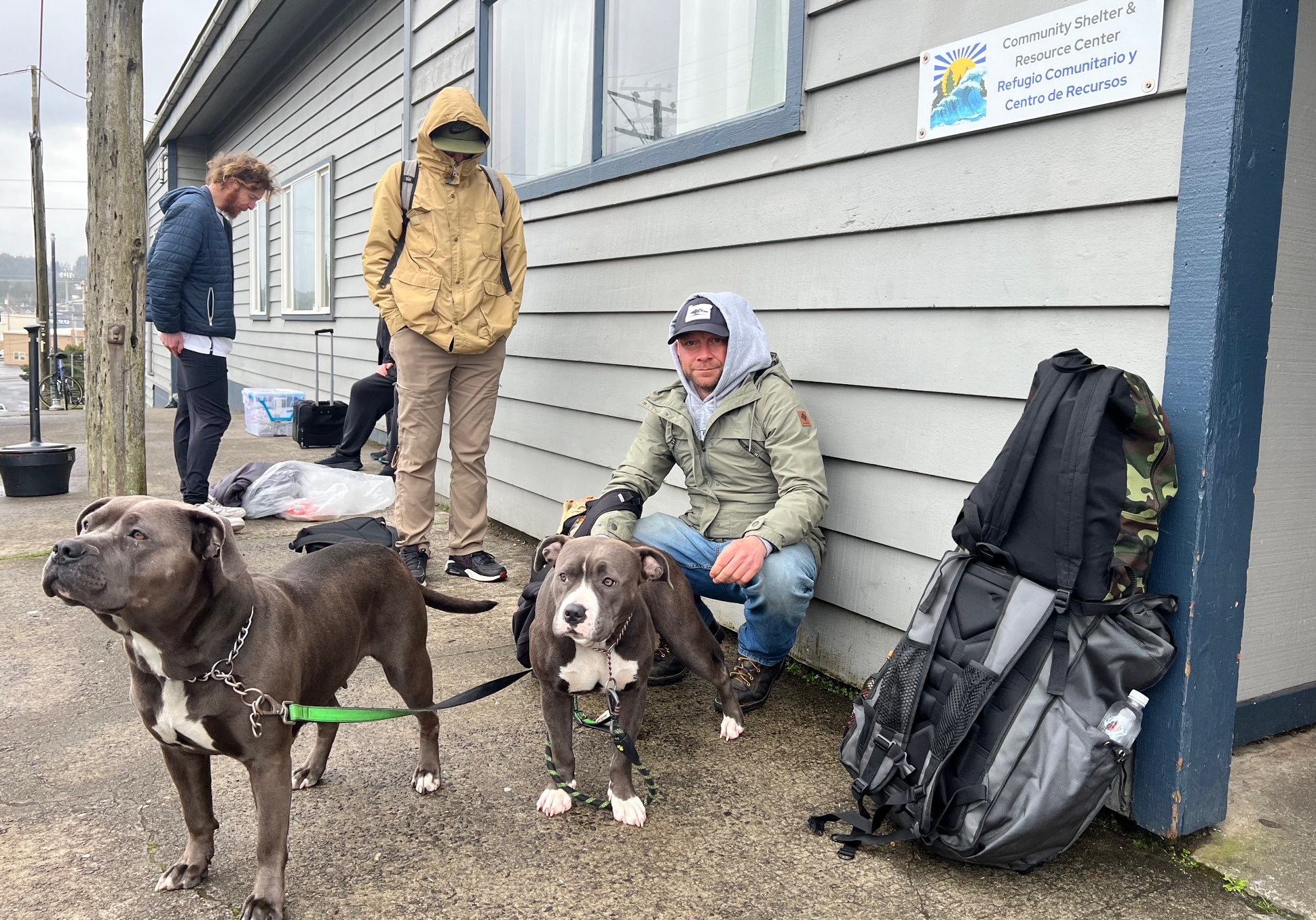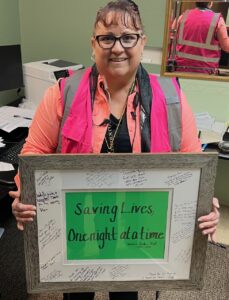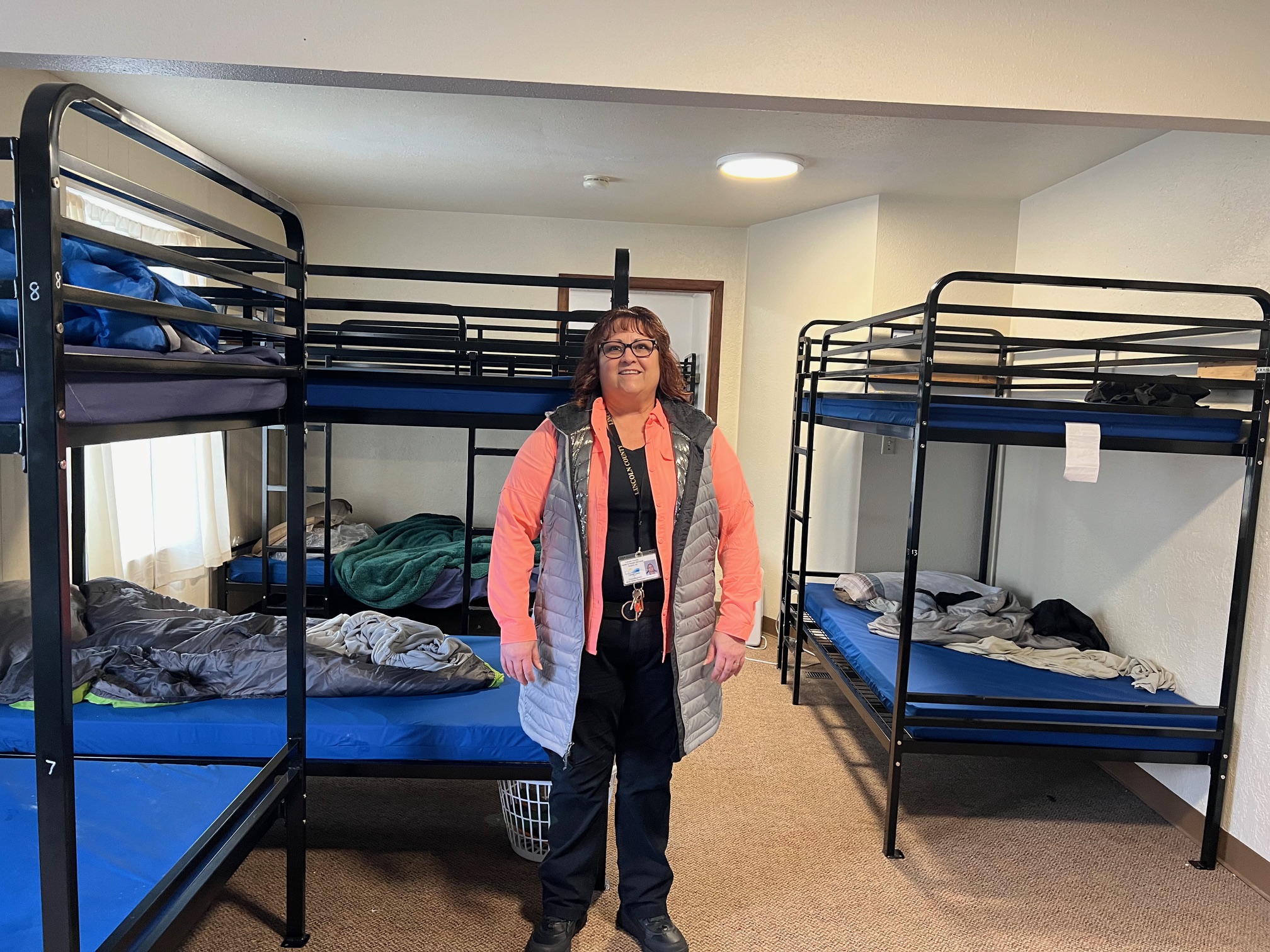
By QUINTON SMITH/YachatsNews
Chantelle Estess escorted the last of the winter shelter’s homeless guests out of the downtown Newport building at 7 a.m. Monday to spend another day on the street.
By nightfall, for the first time since October, there was no place for them to get a hot meal, do their laundry and find a bed in a safe, clean place for the night.
Six homeless men and women spent their last night Sunday in Lincoln County’s first effort to provide winter shelter to the homeless from Oct. 1 to April 1. Now, homeless in the county have to make do without a walk-in shelter for six months.
The county’s “low-barrier” shelter opened in a Newport church last October, then moved in November to a newly acquired building on Southwest Seventh Street just off U.S. Highway 101. The program had the daunting task to find two facilities, staff, volunteers and partner organizations just months after county commissioners ponied up hundreds of thousands of dollars to launch it.

While its staff, county managers, commissioners and partners praise the first year’s effort, they now face another big hurdle – corralling a steady stream of money to not only remodel and again operate the Newport shelter, but create a similar center in a recently-purchased building in Lincoln City.
And open the doors all over again in six months.
“Our shelter’s mission is ‘Saving lives one night at a time’,” said Estess, who came from northern California last September where she had previously run such an operation. “Absolutely, we have saved lives. And that’s the point – we want to save lives.”
The county kept very close track of the numbers for the Newport shelter and a motel voucher program it started in January in Lincoln City. Here’s a quick look:
- Nights: Open 180 nights in Newport and 90 nights in Lincoln City with an average of 26 people per night in Newport and 13 per night in Lincoln City;
- Ages: Two younger than 5; two were older than 80; 42 percent were 50 years old or older;
- Number served: 230 different people;
- Sex: 142 men, 75 women, eight transgender; five non-binary;
- Hometowns: Newport, 58; Lincoln City, 50; Waldport, 18; Siletz, 10; Yachats, 6; Toledo, 5; Depoe Bay, 5; Eugene, 8; Portland 2; rest of Oregon, 37; and, out of state, 26.
Funds needed
The effort is not cheap. This week the county and Housing Authority of Lincoln County are beginning to approach the seven cities in the county to ask them to help pay for 2024-25 operations – and make a long-term funding commitment.

“I think we did a pretty good job,” said Jayne Romero, director of the county’s Health & Human Services Department which oversaw the shelter operation. “We’ve reduced the problem, we’ve reduced the load on police agencies and we’ve provided a shelter to keep people safe. Houselessness is a community problem, the community has to help solve it — and they will.”
The housing authority bought the Newport building for $650,000. But it needs a complete interior remodel – kitchen, laundry, bathrooms and sleeping areas — to make it more efficient, safer and to expand the number of beds from 38 to 50. That’s estimated to cost $450,000.
Romero said the county will provide $200,000 of the remodeling expense. On Monday night, housing authority executive director Karen Rockwell asked the Newport City Council to provide the remaining $250,000, which the city council agreed to do using its remaining pandemic relief funds.
The county says it will have spent $820,000 to operate the Newport shelter and a staff-monitored motel voucher program it began in Lincoln City in January after it was unable to find a suitable building or location there. In March, the county purchased a former storage building for $350,000 in Lincoln City and will need to install a kitchen, bathrooms, laundry and a fire suppression system before it can open Oct. 1. The county is not yet sure how much that will cost.

How shelter works
The homeless begin lining up outside the Newport shelter by 5 p.m. before check-in begins at 6 o’clock each night.
Romero said the county got three complaints from neighbors during the shelter’s operations, but there were no calls for police, fire or ambulance service. Police dropped off 29 people at the shelter, 19 came from hospital emergency rooms and 11 were after-hours crisis placements.

The county distributed bus passes to organizations outside of Newport and Lincoln City so they could help people get to the shelter or motel.
As they enter, shelter staff check the men and women for weapons, drugs and any other banned items. Once inside, guests hand over their belongings to store for the night, then have access to showers, laundry, have dinner and its lights out at 10 p.m.
At the height of its operation, the county had 17 full and part-time staff working two shifts – 5 p.m. to midnight and midnight to 8 a.m. – at the Newport shelter and the Lincoln City motel it used for vouchers. There were 29 people who volunteered at the shelter – going through training and getting a background check – during the six months.
Estess said any homeless parents with children were given vouchers to stay in a motel.
The surprise to everyone, she said, was the number of elderly.
“There’s a lot more chronically under-house elderly folks here,” Estess said, especially ones with health issues. “I don’t think anyone understood those numbers.”
It was initially thought shelter staff could help the homeless staying there with housing, mental health and disability services. After discovering that was not realistic, the county hired two staff in January to work as “navigators.”
The result was that 24 of the 230 people served were placed in transitional housing such as Helping Hands or Phoenix Rising in Lincoln City or the newly opened Nate’s Place in Newport, five found permanent housing, and four were placed in adult foster care.
“The opening of Nate’s Place was a big help,” Estess said. “It opened a door for those folks who have been waiting for a bed. It took a good chunk of our guests.”

Evaluation time
But there will be no slowdown for county or housing authority officials involved in the program.
“Now we’re in evaulation mode, looking at what we did and what we need to do better,” Romero said.
Shelter staff have surveyed the guests to see what they liked about the operation – they liked the staff, rules and compliance to them, but asked if the morning checkout time could be later than 7 o’clock.
Estess will now spend time smoothing out volunteer operations in hopes of getting more, talk with police, fire and hospital leaders, reconnect with organizations around the county to align programs and potential help, talk with neighbors of both shelters, and get staff trained and hired by the end of August.
“Building relationships will be critical for the fall,” she said.
The job of Romero and county commissioners will be to build financial support to operate the two shelters for six months each winter. The biggest ask will be of the county’s two largest cities where the most homeless came from and where the shelters are located.
Romero said the county is committed to paying the $225,000 yearly cost for the two homeless “navigators.”
The county expects 2024-25 shelter operating costs to be $820,000 and is prepared to contribute $447,000 toward that. That leaves a balance of $373,000, Romero said in a letter to city managers and mayors — and it will ask Newport and Lincoln City to contribute $100,000 each. That leaves a balance of $173,000. The Newport council agreed to discuss the $100,000 allocation during its upcoming budget deliberations.
Romero said the county has not yet determined how much to ask the cities of Waldport, Depoe Bay, Toledo, Siletz and Yachats to contribute. Waldport and Toledo did not contribute anything, and Siletz just $500.
“The county will also continue to look for funding opportunities from other community partners and grant sources to secure the balance of the finding,” Romero said in her letter. “All contributions, regardless of the amount, are needed and welcomed.”
But the public and city councils should realize that the shelters are just the first step in a more robust local response to housing and homeless issues, she told YachatsNews.
“The very first step in that continuum of services is an emergency shelter – and we’re providing that shelter,” she said. “These are good facilities, not perfect facilities. We made it work this year … but people showed up to make it possible. Now, we want to move it from a good facility to one that works very well.”
- Quinton Smith is the editor of YachatsNews and can be reached at YachatsNews@gmail.com




$820,000 of our tax dollars to operate these shelters. Fully one third (73) of the 230 unhoused taking advantage of this offer were not from Lincoln County but transients. That is alot of our tax dollars being paid out to those who are not county residents. Since the county’s stated goal was to provide overnight shelter to help residents find housing and services, it is shocking to learn that the county is using our tax dollars to give free room and board to such a huge percentage of tourist transients.
When people can’t afford rent rather it be in Corvallis, Portland or where ever this is probably as good as any place to come. Taxpayers will not be able to foot the bill for all these people or afford to give free housing, free food, free medical. This is just the beginning and I don’t see how it isn’t going to get much worse. My heart does go out to homeless people, I would think some could turn to their families for help, even temporary help. There are jobs out there, but the people who want jobs need a place to shower and clean up.
Thankfully nobody from Newport has ever needed services anywhere else, right Anne?
Community is people helping people, and these folks are currently living in and part of ours. “Saving lives one night at a time unless your last physical address was outside our county; then you should just die” is unlikely to have the same ring to it.
I believe you miss my point. The purpose of these services is to correct the root cause of homelessness for each unhoused individual. At least that is how the county is selling this to taxpayers. The story indicated that these unhoused consider their “community” to be from out of the county or they would not have answered the question and therefore be designated as they were by shelter staff. Local shelter staff cannot effectively assist these transient tourists in addressing their individual problems that cause them to be unhoused. So all that local taxpayers, a large portion of whom are retired and on fixed incomes, are effectively supporting are a free bed and breakfast at Newport and Lincoln City shelters for the 33% of the unhoused staying at the county shelters that were not from Lincoln County. Just plain disrespectful to county taxpayers and not helpful to our resident unhoused to help them get housing. That is the point.
As a staff member of this shelter for four out of the six months we were open — as well as planning on being there the whole next season — I can honestly say that this couldn’t have been said better Jay. Very well put.
I’d rather have the homeless guy housed for the night than trying to break into someone’s outbuilding in his desperate search for shelter. And I’d rather not have my grandson come across granny’s frozen body on the trail in the woods. Maybe it’s just me.